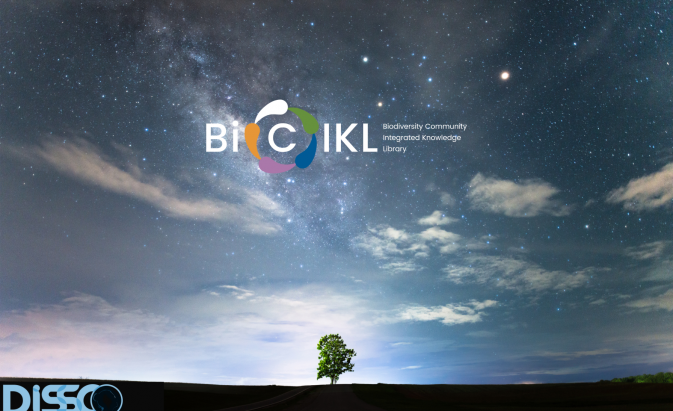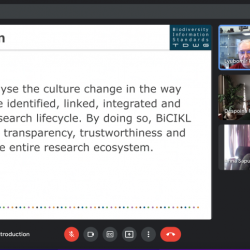There’s a bit of the BiCIKL Project in the future of DiSSCo. It became evident in Brussels, where all the participants and stakeholders of this huge project gathered for attending the three days meeting called DiSSCo Futures (from the 7th to the 9th of February, 2023).
The large meeting gathered around 200 participants at the KBR Auditorium and helped out to zoom out for a big picture of how these projects are converging to a unique scope.
As the future Research infrastructure leaves its preparatory period to enter a new, transitional phase, work will continue towards achieving DiSSCo’s main goal: a new business model for one European infrastructure that digitally unifies all European natural science assets under common access, curation, policies and practices.
But why are we talking about DiSSCo here on the BiCIKL website?
The DiSSCo Futures event marked the moment when three critical to DiSSCo’s future projects: SYNTHESYS+, DiSSCo Prepare, and MOBILISE – came to an end and are about to transfer their outcomes so far to the newly emerging DiSSCo ERIC. In its turn, BiCIKL has a lot to do with that as we all share so many of our aims and goals!
“Some features we’ve been working on in BiCIKL will be useful for DiSSCo too” - says Prof Lyubomir Penev, BiCIKL's Project Coordinator and founder and CEO of Pensoft Publishers - “for instance the architecture design of the Digital Object Identifiers will be adopted by the future DiSSCo ERIC: a brand new pan-European system identifiers” - he recalls - “also, we are now in the process of making available a white paper on publishing practices and technology for taxonomy and biodiversity. It’s one of the results of the publishing group of Mobilise”.
DiSSCo Futures presented more than 70 contributions, mostly in person: it was a very intense program that also had its moment of Art with the performance of Andres Roubens, from the Propaganza collective, who painted a triptych representing DiSSCo.
“The added value of such a meeting has definitely been the synergic effect of being together and the overarching vision the meeting gave on all those projects”, says Ana Casino, CETAF’s Executive Director and co-organiser of DiSSCo Futures together with RBINS Museum and the Africamuseum of Tervuren - “Sometimes it may happen to lose the general overview because of the various different projects and acronyms that seem to go on independently” - she insists - “and they do. But all these projects are bound together because the main idea behind them remains and drives all these people: to enhance the European taxonomic capacity, to raise awareness around the importance of this discipline and to share as much scientific data and findings as possible.”
What is DiSSCo?
The Distributed System of Scientific Collections is a new world-class Research Infrastructure (RI) for Natural Science Collections. The DiSSCo RI aims to create a new business model for one European collection that digitally unifies all European natural science assets under common access, curation, policies and practices that ensure that all the data is easily Findable, Accessible, Interoperable and Reusable (FAIR principles).
DiSSCo represents the largest-ever formal agreement between natural history museums, botanic gardens and collection-holding universities in the world.
Within BICIKL, DiSSCo is one of the nine research infrastructures tasked with providing virtual access services to FAIR biodiversity data. In particular, DiSSCo will be granting access to FAIR specimen and sample data, so that users and other infrastructures can enable networks of connected data from the data resources of molecular biology, natural history collections, taxonomy and literature.
***
Follow BiCIKL on Twitter and Facebook. Join the conversation on Twitter at #BiCIKL_H2020.


